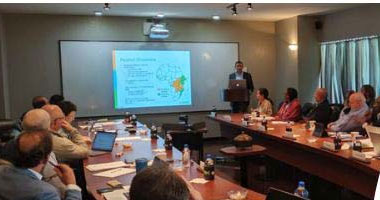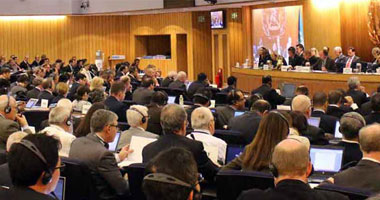Our 2018 strategy to return value to customers, shareholders, employees and communities

Lowell McAdam,
CEO, Verizon
In a recent conference call with investors, I reviewed Verizon’s 2017 financial and operational results, the implications of tax reform to Verizon, and the company’s strategic priorities for 2018. I announced up to $300 million in additional contributions to the Verizon Foundation, and subsequently announced a more than $380 million initiative to return value to employees through restricted stock units or their equivalent value. Following are highlights from my remarks:
In 2017, Verizon regained positive momentum in the marketplace and delivered strong operational and financial results. We launched and expanded the most reliable unlimited experience for our customers, executed the world’s largest successful 5G pre-commercial trial, invested in assets and platforms for the future, and gained significant traction in the integration of new businesses.
We finished the year with great momentum in the fourth quarter, as evidenced by our smartphone net additions and reoccurring levels of outstanding customer loyalty. In addition, the improvement in our Wireless service revenue trajectory positions the business for growth moving forward.
The integration of new businesses is accelerating our mobile-first digital strategy and providing a platform for global reach. In 2017, we made significant progress with our Oath assets as we build engaging brands around the key pillars of news, sports, finance lifestyle.
The game-changing content and technology partnerships that we recently announced with the NFL and NBA are great examples of how we are accelerating our digital-rights strategy with Yahoo sports and Verizon’s family of digital media brands. We’re becoming the first screen for fans of live sports and superior partners for advertisers.
Verizon looks forward
Now let’s take a look forward. We ended the year with the President signing tax reform into law, effectively restructuring the tax code for U.S. corporations. Verizon has long supported corporate tax reform that reduces rates to globally competitive levels, and we’re very pleased to see this legislation passed. The new tax law will have a positive impact Verizon’s cash flow and earnings profile.
We’ve always been focused on keeping our network the gold standard and investing in the business for while strengthening our balance sheet and maintaining strong dividend performance for our shareholders.
This will continue to be the driving force behind the use of cash savings from tax reform -- and by strengthening the balance sheet, it will give us the flexibility to execute our strategies going forward.
Returning value to employees and the community
Our employees drive the innovation and success of our business so it’s vital that we all share in the success of not only tax reform, but the overall performance of Verizon.
We are also good corporate citizens and share our success with the community. In 2017, Verizon and its foundation donated $75 million for disaster recovery and community projects. We will increase our contributions to the Verizon Foundation by $200 million to $300 million over the next two years with the additional funds being dedicated to our efforts around Humanability – and, by “Humanability,” we mean applying our technology to making our customers’ lives better.
Verizon’s focus on network quality and 5G
As we head into 2018, our strategic priorities remain clear and are unchanged. The cornerstone of our strategy continues to be our best which continues to be ranked #1 in the nation in both voice and data network quality.
In our history, Verizon has always been the forefront of technology innovation. We’ve led the transformation of the wireless industry from analog to today’s fourth-generation LTE service. Now, we have an unprecedented opportunity in front of us as we drive the evolution of the U.S. wireless industry to the fifth generation of mobile services.
Not too long ago, people were saying 5G would not be possible until sometime between 2020 and 2022. Only one carrier has been consistent in its actions and messaging regarding 5G. Verizon has the spectrum bandwidth needed to provide the rich services of true 5G, our Intelligent Edge Network capabilities, and engineering to lead the industry in providing the full suite of 5G gigabit services.
The investment in prepositioning of assets will enable us to deliver the full range of 5G services, including mobility, residential broadband, sub-millisecond latency applications, and other advanced consumer and IoT (Internet of Things) use cases. We have flexed our innovation muscle and are now taking 5G from a mere possibility to commercial reality by bringing 3 to 5 cities online this year with commercial services.
The next industrial revolution will be on Verizon’s network, and it will positively impact society like no technology we have seen before.
As we say around our offices, we don’t wait for the future, we build it -- and we’re doing it again with 5G.
Forward-looking statements
In we have made forward-looking statements. These statements are based on our estimates and assumptions and are subject to risks and uncertainties. Forward-looking statements include the information concerning our possible or assumed future results of operations. Forward-looking statements also include those preceded or followed by the words “anticipates,” “believes,” “estimates,” “hopes” or similar expressions. For those statements, we claim the protection of the safe harbor for forward-looking statements contained in the Private Securities Litigation Reform Act of 1995. We undertake no obligation to revise or publicly release the results of any revision to these forward-looking statements, except as required by law. Given these risks and uncertainties, readers are cautioned not to place undue reliance on such forward-looking statements. The following important factors, along with those discussed in our filings with the Securities and Exchange Commission (the “SEC”), could affect future results and could cause those results to differ materially from those expressed in the forward-looking statements: adverse conditions in the U.S. and international economies; the effects of competition in the markets in which we operate; material changes in technology or technology substitution; disruption of our key suppliers’ provisioning of products or services; changes in the regulatory environment in which we operate, including any increase in restrictions on our ability to operate our networks; breaches of network or information technology security, natural disasters, terrorist attacks or acts of war or significant litigation and any resulting financial impact not covered by insurance; our high level of indebtedness; an adverse change in the ratings afforded our debt securities by nationally accredited ratings organizations or adverse conditions in the credit markets affecting the cost, including interest rates, and/or availability of further financing; material adverse changes in labor matters, including labor negotiations, and any resulting financial and/or operational impact; significant increases in benefit plan costs or lower investment returns on plan assets; changes in tax laws or treaties, or in their interpretation; changes in accounting assumptions that regulatory agencies, including the SEC, may require or that result from changes in the accounting rules or their application, which could result in an impact on earnings; the inability to implement our business strategies; and the inability to realize the expected benefits of strategic transactions.
Subscribe to Industry Era
News
This Apple Watch Case Could Kill All of Those Wannabe AI Devices
Google defends AI search results after they told us to put glue on pizza
Google scales back AI search answers after it told users to eat glue
FAA won't approve increased 737 Max production in near future
Thursday was a sour day for the US economy — with an important silver lining
OPEC+ working on complex production cut deal for 2024-2025, sources say
Stock futures inch lower as investors review earnings, brace for inflation report: Live updates
Salesforce Shares Plunge by Most Since 2008 After Weak Outlook
Jeep’s Wagoneer S Trailhawk concept teases a fully electric off-roader
Gap’s stock jumps 23% as the retailer swings to profit and raises guidance
Medline recalls 1.5 million bed rails linked to deaths of 2 women
Oil falls as Fed policymakers look to maintain rate cuts, gasoline stocks rise










